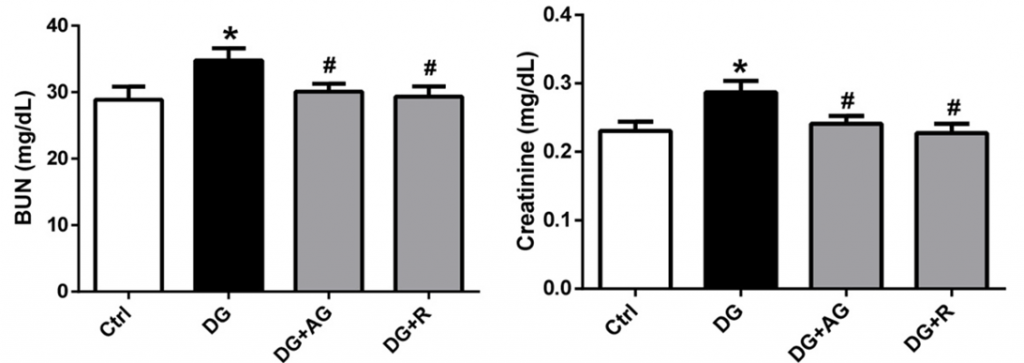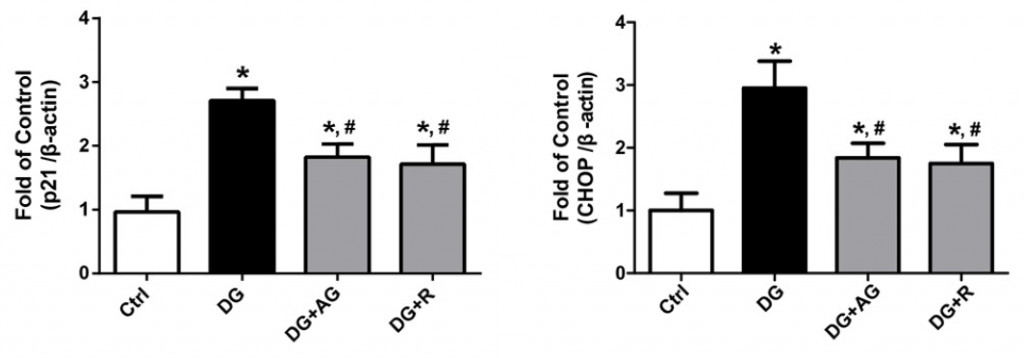Key Points:
- Injecting age-accelerated mice with resveratrol prevents tissue damage to their kidneys.
- Resveratrol improves kidney function, as measured by clinical blood markers.
- Age-accelerated mice treated with resveratrol display reduced senescent cells in the kidney.
As many as nine out of ten adults don’t know they have chronic kidney disease (CKD), according to the CDC. This decline in our kidneys’ capacity to filter blood may in part be due to senescent cells — cells that accumulate with age and promote inflammation and tissue damage. However, scientists from National Taiwan University have found that resveratrol could deter kidney dysfunction by getting rid of these senescent cells.
As published in Metabolites, Lan and colleagues show that resveratrol alleviates kidney deterioration in age-accelerated mice. They also show that blood markers of kidney dysfunction are elevated in the age-accelerated mice. However, these markers are reduced by resveratrol treatment. Furthermore, resveratrol reduces markers for senescent cells in the kidney.
Resveratrol Protects Against Kidney Aging
Scientists often induce premature aging in young mice by injecting them with a sugar called D-galactose. This leads to a massive increase in oxidative stress, a hallmark of aging that accelerates the aging process. Lan and colleagues generated age-accelerated mice to determine how resveratrol affects CKD, which is associated with kidney aging.
It was found that the age-accelerated mice displayed measurable kidney damage, including increased levels scarring called fibrosis. However, injecting the age-accelerated mice with 40 mg/kg of resveratrol prevented this damage. Kidney deterioration was also prevented by 100 mg/kg of a drug called aminoguanidine (AG).

Aminoguanidine targets glycation end-products (AGEs), which are byproducts of normal metabolism that accumulate with age. AGEs potentially accelerate the aging process by promoting oxidative stress and inflammation. Both resveratrol and aminoguanidine were shown to reduce AGEs in the kidney of age-accelerated mice, which may be one way these anti-aging compounds exert their effects.
To assess kidney function, Lan and colleagues measured blood markers from the age-accelerated mice. They found that untreated age-accelerated mice had an increase in blood urea nitrogen (BUN) and creatinine, suggesting poor kidney health. However, age-accelerated mice that were treated with resveratrol or aminoguanidine did not display these indicators of kidney dysfunction.

To determine the relationship between kidney deterioration and senescent cells, Lan and colleagues measured the levels of senescence-associated proteins, including p21 and CHOP. They found that both p21 and CHOP were elevated in the kidneys of age-accelerated mice. However, this elevation in senescence was prevented by treatment with either resveratrol or aminoguanidine.

Overall, the findings of Lan colleagues suggest that resveratrol and aminoguanidine prevent kidney damage and dysfunction by reducing senescent cell burden. Notably, they also showed that resveratrol and aminoguanidine increase kidney α-klotho, a protein associated with shortened lifespan when deficient. Other senolytics have also been shown to elevate α-klotho, which improves the memory of aged mice.
The Senolytic Action of Resveratrol
Previous studies have shown that resveratrol acts as a senolytic — a compound that eliminates senescent cells. The senolytic action of resveratrol has been shown to slow cardiac aging and reduce brain inflammation in rodents, the latter of which may explain how resveratrol improves cognition in Alzheimer’s mice and aged rats. Other senolytics have also been shown to alleviate heart, kidney, and brain aging, supporting the idea that senescent cells drive aging.
Resveratrol is a plant-based compound called a polyphenol. As such, it occurs naturally in various fruits and vegetables, including grapes. Its presence in grapes has led many to believe that the benefits of resveratrol can be reaped by drinking red wine. However, the concentration of resveratrol in wine (about 1 mg) is nowhere close to the doses used in human studies.
For example, a dose of 75 mg of resveratrol was shown to improve cognition in type 2 diabetes patients. Doses up to 1g may reduce brain inflammation in Alzheimer’s patients. Overall, doses ranging from 1 to 5 g are considered safe. Still, more studies are needed to assess the effects of resveratrol on age reversal in healthy individuals.